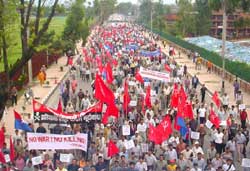 In the latest salvo in the Battle of the Letters, the Maoists replied Thursday to a government reply to their earlier reply to the government's letter last week accepting an invitation to restart the stalled peace process.
In the latest salvo in the Battle of the Letters, the Maoists replied Thursday to a government reply to their earlier reply to the government's letter last week accepting an invitation to restart the stalled peace process.
The statement from Maoist leader Prachanda followed a government gesture Tuesday releasing three imprisoned Maoist leaders and giving details of the whereabouts of 35 cadres. "The government hasn't agreed to all our demands, but overall its response is positive," Prachanda said. "We must now move from technical issues to political ones." The Maoists have also asked the government to bring the political parties into the peace process.
Member of the negotiating team and information minister Kamal Thapa told us a major hurdle had been overcome. "It is clear we agree on the goals, but we differ on the approach," he said. "We will try our best to get the political parties on board, and hope the talks can begin as soon as possible."
Thapa and his boss have reason to be relieved, since the government has not been able to hold formal talks with the Maoists since coming to power two months ago.
Statements by the Maoists and the government this week clearly show that both have yielded to overwhelming public opinion against a resumption of hostilities. There also appears to have been international pressure, with letters urging a resumption of talks from UN Secretary General Kofi Anan and British development minister Baroness Amos. There was also a push from parliamentary parties, with a big pro-peace UML rally in Kathmandu on Thursday (see pic).
The Maoists seem to have used a carrot-and-stick approach, timing their agreement to resume talks with a socket bomb attack on an army vehicle Wednesday afternoon in Sindhuli that killed two soldiers. In Nuwakot, Maoists issued a specific threat against charities taking money from 'American imperialists' warning them of dire consequences.
The talks may restart, but the peace process is still fragile. The code of conduct is being openly flouted by both sides, and the next round will have to move beyond confidence building measures to difficult political and military issues.


